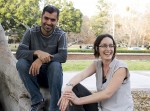BY KAYLA HAUSMANN
A&E contributor
khausmann@media.ucla.edu
Farzad Amoozegar straddled two cultures, North American and Iranian, throughout much of his childhood. Before he was 9, the Persian language, culture and food had begun to shape his identity as an Iranian; after moving to Canada and then to America, he discovered music to bridge the gap between Iran and the West.
“All these memories I had of Iran, my grandfather, all that – they stuck with me,” Amoozegar said. “I tried to build on that and play more.”
Amoozegar, an anthropology and ethnomusicology graduate student, and a group of 13 performers will play Middle Eastern music in Powell Library on Saturday. The event, called “Voices of the Olive Branch,” will include Iranian, Palestinian and Jewish forms of musical expression. Amoozegar said he wants to bring these musicians together to show they can coexist and play music in harmony.
The performance will begin with regional music from Israel and Palestine. Amoozegar said the Israeli cantors’ spiritual music will set the mood, which will transition to more upbeat performances with Turkish and Lebanese music. The night will come full circle by concluding with slow and mystical Iranian music.
“My focus, in the States and outside the States, is just to come together and celebrate humanity,” he said.
His friend and colleague Yael Assor, an anthropology graduate student, began working with him on the idea for the “Voices of the Olive Branch” project in September 2015. Amoozegar said the olive branch is a symbol of peace and harmony.
Amoozegar wanted to bring music and musicians from different parts of the Middle East to show they could all coexist together, despite the violence that has plagued the region.
“I was born in Iran; I was born during a war,” Amoozegar said. “And I’ve seen some (things). I don’t wish it upon anyone. War, violence, carnage – it’s not a joke; it devastates communities for years and years to come.”
Assor said she hears of people with narrow perspectives who associate the region only with violence or fighting. She said this Saturday’s musical experience will provide a humanizing connection to these cultural groups, conveying the quotidian experiences of their people.
Despite any conflicts, Assor said music is a reminder of a shared human essence and helps to convey what it is like to be a part of that region.
Amoozegar said he thinks the best way forward is through diplomacy and bringing together people from different parts of the world, including Iran, Israel and Palestine, to make their voices heard.
“People (from the Middle East) are not that different from UCLA people,” Amoozegar said. “Still, people fall in love; still, people do music.”
A photography exhibit by Tomer Appelbaum documenting everyday life in Jerusalem will be showcased in Powell to accompany the musical performances.
Münir Beken, an assistant professor of ethnomusicology, will be performing during the event. He said music is universal, and that the concert will remind people of their similarities.
“The same rain falls on all of us; the same sun shines on all of us. We have all kinds of shared experiences, and hopefully people will think about that and not look at people as ‘others,’ but really just fellow beings,” Beken said.
Amoozegar said he thinks “Voices from the Olive Branch” could lead to more ambitious projects in the coming year, like a live performance from Jerusalem featuring Israelis and Palestinians.
He and Assor hope to bring a different perspective of the Middle East by showing its culture beyond the conflict that characterizes its presence in the news.
“There is nothing better than that everyday life,” Amoozegar said. “It has a nice melody to it.”
